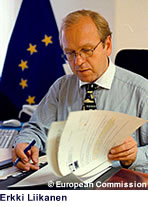Liikanen reinforces the need for e-security
Despite a growth in the importance of the Internet for the European Union, greater security is necessary if there is to be more confidence in using it for transactions. This was one of the main messages given by European Commissioner for Enterprise and Information society, Erkki Liikanen when speaking to the European electronic signature standardisation initiative (EESI) conference in Brussels on 19 June. Speaking a month before the deadline for Member States to implement the provisions of the EESI directive into their national legislation, Mr Liikanen said that the main objective of EESI was to allow for better legal recognition of electronic signatures in the European Union, allowing for recognition not only between Member States, but also for transactions with countries outside the EU. The plan will only work, Mr Liikanen stressed, if there is a coherent take up of it by the private sector. 'Law makers have done their work. It is now up to the private sector, in cooperation with public authorities, to find practical business solutions,' he said. If this is done, there will be a greater take up of electronic commerce in Europe, he added. With EESI, there is a possibility to have an agreed set of technologically neutral standards that would have been arrived at through trust and cooperation between the public sector authorities and the private sector companies. 'This is particularly important for the e-economy, as the information society services require a high level of trust and security and this in a business environment where technologies are rapidly changing,' said Mr Liikanen. He went on to stress that 'only standards that are widely used have an impact on the market.' In addition to security, Mr Liikanen has also made reference to the importance of privacy on the Internet. Speaking on 15 June at the meeting of the comité Européen d'assurances in Helsinki, Mr Liikanen highlighted that he saw the EU as being in the front line in addressing these issues. Not only has extensive EU-wide legislation been approved, he said, but there are also forthcoming proposals addressing fighting cybercrime, as well as a common policy approach for network and information security. He went on to emphasise that the area is a particularly difficult one due to the need to have neither too much legislation, which could stifle development, nor too little, which could mean no increase in e-confidence. Finally he paid tribute to the role of European Union research in the area and looked forward to the contributions of the IST (information society technologies) programme in the forthcoming Sixth Framework programme. Shortly after Mr Liikanen's speech to the EESI conference, the UK's top Internet police officer, detective chief superintendent Len Hynds, claimed that a new system which allowed companies to report cybercrime was required. Mr Hynds told a conference in Glasgow that many crimes committed on the Internet are not reported by the companies concerned because they fear the exposure of the inefficiency of their security measures. This makes the scale of Internet crimes against business difficult to gauge and can only be tackled by setting up a confidential channel for reporting this type of crime, he said.

